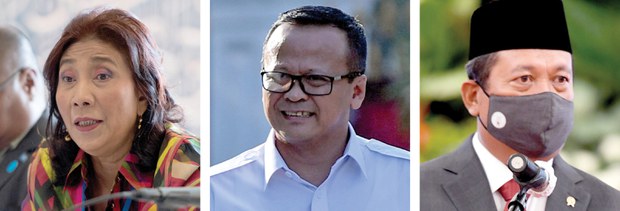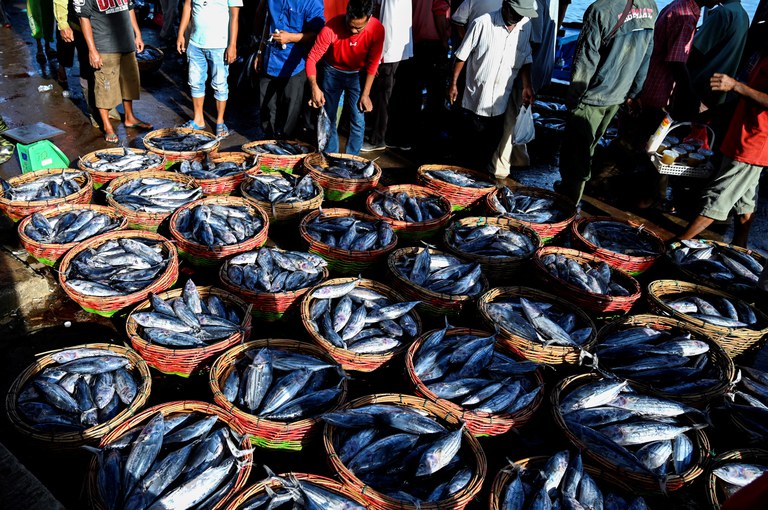A Tale of Three Indonesian Ministers and a Flip-Flopping Fisheries Policy
2021.09.06
Tokyo
 Three different people have served as minister of marine affairs and fisheries under Indonesian President Joko Widodo: (left to right) Susi Pudjiastuti, Edhy Prabowo and Sakti Wahyu Trenggono.
Three different people have served as minister of marine affairs and fisheries under Indonesian President Joko Widodo: (left to right) Susi Pudjiastuti, Edhy Prabowo and Sakti Wahyu Trenggono.
Indonesia’s new fisheries minister faces a challenging task as he follows in the footsteps of a pro-business politician now locked up for taking bribes, and a tough-talking seafood exporter whose boat-burning policies made her wildly popular with fisher folk.
But analysts say the portfolio is an important one because the sprawling archipelago nation can take a leading role in boosting Indonesia’s economy while combating illegal, unreported and unregulated fishing, which the United Nations describes as one of the greatest threats to marine ecosystems and fisheries sustainability.
“Indonesia is the world’s second largest producer of seafood and it is important to have their leadership,” Sally Yozell, who directs the environmental security program at the Stimson Center, a Washington think-tank, told BenarNews. “The new minister doesn’t have to be public and outward, but the fisheries minister needs to be a champion for the fishing community.”
Edhy Prabhowo, Sakti Wahyu Trenggo’s immediate predecessor as fisheries minister, lasted only 13 months in the job. Sakti is third person to be appointed the post by President Joko “Jokowi” Widodo, who was first elected in 2014.
Edhy’s time in office ended abruptly last November with his arrest on suspicion that he took 25.7 billion rupiah (U.S. $1.8 billion) in bribes to lift a ban on lobster larvae exports. The lifting allowed lobster larvae to be exported to China, Vietnam and Singapore. But the move was heavily criticized as harmful to Indonesia’s wild lobster stock as well as damaging local economies through lost revenue.
In July, Indonesia’s Corruption Eradication Commission (KPK) sentenced Edhy to five years in prison for accepting cash in exchange for issuing permits for the export of lobster larvae. His conviction sealed the end to Edhy’s unpopular tenure as minister.
Edhy went to prison two years after President Joko “Jokowi” Widodo decided not to reappoint Susi Pudjiastuti, a businesswoman and owner of a seafood export company, as fisheries minister. She was best known for her up-front demeanor, public charisma, and willingness to travel around the country and spend time on boats with fishermen.
In addition to her aggressive approach to fighting illegal fishing from China, Vietnam and elsewhere – most visibly through a policy of sinking and blowing up foreign boats caught poaching in Indonesian waters – Susi also made the country’s boat tracking data public, and pushed regulations to reduce the use of environmentally dangerous and unsustainable fishing practices. This included initially implementing the ban on lobster larvae exports in 2016.
“Minister Susi was a brilliant person who really understood, politically, how to balance being a person of the people, a champion of the fishing community, but also the economic importance of sustainably managing fisheries,” Yozell said.
Edhy, a confidante of former presidential candidate and current Minister of Defense Prabowo Subianto (no relation) was a member of Parliament from 2009-2019, and had no experience in the fisheries sector.
He undid several of Susi’s policies, putting a stop to the sinking of illegal boats, and re-starting the licensing of foreign fishing vessels, which, with better boats and technology, often out-compete Indonesian fishermen for diminishing fish stocks.
“Edhy put growth ahead of conservation, and how to protect fisheries,” said Arifsyah Nasution, oceans campaigner at Greenpeace Indonesia, who is based in Aceh. “Most of the Indonesian fisheries areas are exploited or over-exploited, but [he] re-opened licensing for foreign fishing boats, the same ones Susi cracked down on in 2015.”
His successor, Sakti, has thus far taken a more moderate approach, including re-implementing some of Susi’s policies. Originally from Central Java, Sakti is close to Jokowi, and is best known for founding two telecommunication firms.
“Pak Sakti tries to be more moderate, not so pro-business, and gives more room for input for civil society,” Arifsyah told BenarNews.

Investments over marine conservation
It may not matter, as the Ministry of Marine Affairs and Fisheries no longer has as much authority or sway as it did under Susi. That’s because there has been a shift in power to another cabinet member, Luhut Binsar Pandjaitan, the coordinating minister for maritime and investment affairs.
“The key decision-maker on how the Indonesia government manages marine areas is not the Ministry of Maritime Affairs anymore,” said Arifsyah. “Luhut’s influence is quite big.”
Under Jokowi, Luhut plays a key role in attracting foreign investment, and has a close relationship with Chinese Foreign Minister Wang Yi.
Luhut’s role in President Jokowi’s cabinet has been growing, with some even calling him the “real president.”
A former military commander, he is also a businessman with significant interests in natural resources. He was a key force behind Indonesia’s Omnibus Bill on Job Creation, passed last October, which included many clauses that concern Arifsyah when it comes to marine livelihoods.
“Under the omnibus law, we’re concerned that coastal communities and Indigenous peoples are at threat of their livelihoods being violated by the expansion of coastal mining, sand mining, ports, and reclamation projects,” Arifsyah said.
Environmentalists are concerned that the omnibus law will speed up the approval process for potentially harmful infrastructure projects, reduce the requirements for Environmental Impact Permits, and limit the role that civil society and community groups play in challenging projects.
Reclaiming leadership
Exactly why Susi wasn’t re-appointed, despite her popularity, remains unclear.
Some believe that foreign concerns, including from China, played a role. The country was, prior to 2015, the main source of illegal foreign fishing in Indonesian waters; according to a study, Chinese vessels that engaged in IUU fishing were responsible for between 2,000 and 5,000 hours of fishing per month – nearly 10 times that of the next biggest perpetrators, Thai vessels.
“For those in the elite who were doing trade with foreign countries, particularly China, she was upsetting them,” Yozell said. “They thought it was time for her to go.”
Fabio Scarpello, a researcher at the University of Auckland in New Zealand who studies Indonesian fisheries, believes that Susi’s combative style also played a role.
“Susi’s harsh managerial style alienated many parties,” Scarpello told BenarNews. “The coalition against Susi included fisheries companies both in Indonesia and abroad, lawmakers and senior politicians.” This may have been why, despite her popularity among the regular Indonesians, she was replaced.
Under her management, Indonesia took a global leadership role on fisheries and marine protection. The country hosted the Our Oceans conference in 2018, and was active at international forums.
That has mostly been abandoned, and it’s unclear if Sakti will resume it.







